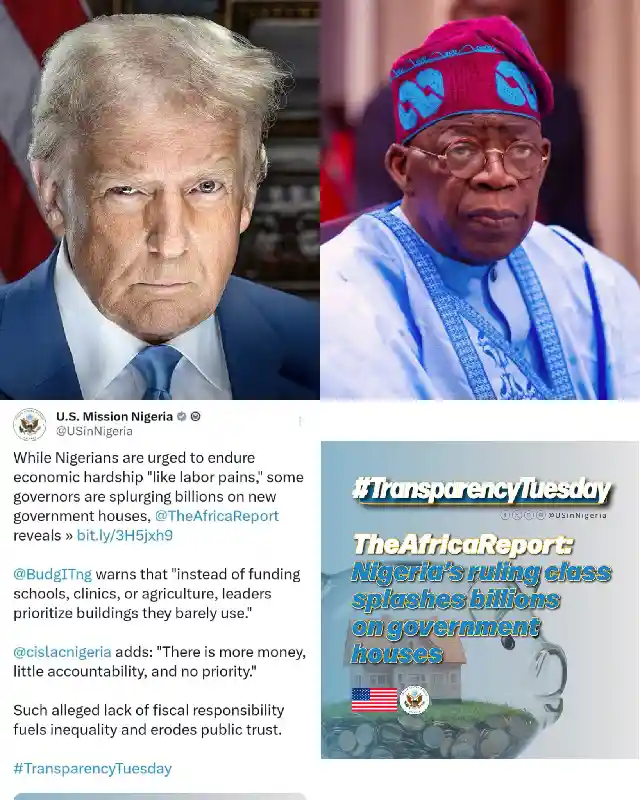Fiscal Recklessness Eroding Public Trust, Say Critics
While millions of Nigerians continue to grapple with skyrocketing inflation, food insecurity, and economic stagnation, concerns are mounting over the alleged wasteful spending by President Bola Ahmed Tinubu’s administration and some state governors.
TJ News Nigeria reports that the U.S. Mission in Nigeria (@USinNigeria) has amplified criticism of Nigerian leaders’ spending priorities, citing a report by The Africa Report which exposed how public officials are allocating billions of naira for new luxury government buildings—even as citizens are urged to “endure hardship like labor pains.”
“While Nigerians are urged to endure economic hardship ‘like labor pains,’ President Bola Tinubu and some governors are splurging billions on new government houses,” the U.S. Mission wrote in a post on X (formerly Twitter), referencing The Africa Report’s findings.
Pay Attention To: Abuja Woman Accuses Doctor at Divine Reign Hospital of Stealing Her Twin Baby During Delivery
BudgIT Nigeria Decries Misplaced Priorities
Prominent civic-tech organization BudgIT Nigeria (@BudgITng) also condemned the trend, warning that Nigeria’s leadership continues to misallocate scarce resources away from critical sectors.
“Instead of funding schools, clinics, or agriculture, leaders prioritize buildings they barely use,” BudgIT stated.
The group emphasized that public budgets should focus on human development needs such as education, healthcare, and food production, especially at a time when over 63% of Nigerians live in multidimensional poverty, according to the National Bureau of Statistics (NBS).
CISLAC: More Money, Less Accountability
The Civil Society Legislative Advocacy Centre (CISLAC) (@cislacnigeria) added its voice, accusing the government of poor fiscal accountability.
“There is more money, little accountability, and no priority,” CISLAC said, calling for stronger oversight, transparency, and citizen engagement in budgeting processes.
CISLAC also warned that this pattern of unchecked executive expenditure could undermine Nigeria’s long-term development goals and deepen income inequality.
Public Reactions and Growing Disillusionment
The growing outcry reflects widespread disillusionment across Nigeria, where citizens face daily struggles including:
- Persistent power outages
- Fuel and transport cost spikes following subsidy removal
- Rising food and rent prices
- Underfunded education and public health systems
Activists say that this visible disconnect between government spending and the people’s pressing needs is eroding trust in leadership and governance institutions.
“How can leaders tell the people to tighten their belts, while they expand their own comfort zones?” one civil society advocate asked anonymously in Abuja.
Calls for Legislative Oversight and Reform
Policy experts are urging the National Assembly and state houses of assembly to exercise more robust budget scrutiny, especially over capital projects such as new government buildings, fleets, or non-essential contracts.
Development economists argue that if misallocation of resources continues unchecked, it could stall progress on SDGs, worsen social unrest, and stifle private sector growth due to limited public infrastructure support.
Summary of Key Points
- U.S. Mission flags report on excessive government spending amid economic hardship.
- BudgIT warns of misplaced priorities—emphasizing underfunded schools and clinics.
- CISLAC decries poor accountability, urges focus on people-centric development.
- Public discontent is growing as inflation, hunger, and unemployment bite harder.






